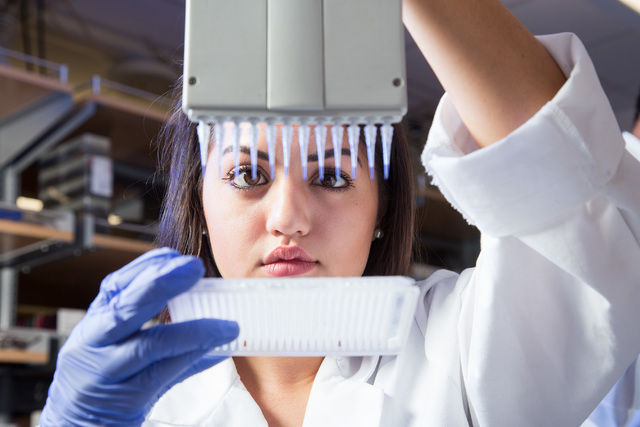LIHUE — Brooke Laoliokalani Spencer is an 18-year-old Kapaa graduate who is a sophomore at Brigham Young University in Provo, Utah. She’s like any other college student — studying, spending time with friends, and digging through couch cushions to scrape
LIHUE — Brooke Laoliokalani Spencer is an 18-year-old Kapaa graduate who is a sophomore at Brigham Young University in Provo, Utah.
She’s like any other college student — studying, spending time with friends, and digging through couch cushions to scrape up enough change for a coffee — but in September, her world changed.
That’s when Spencer found out she’d received a $70,000 grant from the National Institute of Health for Alzheimer’s research. The grant covers tuition, books, health insurance, lab wages and travel to academic conferences through graduation.
“Undergrads rarely get grants of this nature; it’s usually people that have been doing research for a while,” said her mother, Tiffany Spencer. “This is rare and she’s so excited.”
Brooke Spencer said it started with a phone call from the BYU research lab.
“This summer I was contacted by the lab manager and she offered me a position to work in the lab as an assistant,” Spencer said. “Normally you have to apply and go through a huge process to work in the lab. They came to me.”
She jumped on the opportunity because Alzheimer’s disease hits close to home, and this was an opportunity to help forward the search for a cure.
“What inspired her was her grandmother; she was Brooke’s idol,” Tiffany Spencer said. “Her grandmother lived with us and just passed away this year from cancer, but Brooke got to see what it’s like to get old.”
Brooke Spencer said her grandmother was experiencing the onset of dementia and Alzheimer’s disease before she died.
“It was so terrible, so to be able to work on this new, innovative research and getting one step closer to curing it one day is amazing,” she said. “I’ve seen firsthand the effects it can have on people.”
When she set foot onto BYU’s campus, lab research wasn’t necessarily on Spencer’s radar — she’s a biology major that wanted to be a physical therapist.
She was inspired to pursue the career at a young age, when her father was diagnosed with Guillain-Barre Syndrome, which is a disease in which the immune system attacks the peripheral nervous system.
“He was paralyzed from head to toe and had to go to physical therapy to relearn how to do everything,” she said. “The physical therapists brought him back and they were superheroes to me.”
Spencer wants to be that superhero for others as well.
“I want to help people and make a difference in people’s lives,” she said, “and now, with this new lab work, there’s a possibility of a shift in the career (I am pursuing).”
Spencer’s mentor, biology professor John Kauwe, also had an influence on her,
“He’s a very successful doctor from Molokai and his big push was for getting Polynesian students involved in lab science,” Spencer said. “As soon as I was offered the position (as a lab research assistant), he told me to apply for the grant.”
She had three days to get all of the required paperwork together for the grant, including an essay.
“When he told me that I got the grant, I was expecting a couple grand, not $70,000,” Spencer said. “I wanted to keep it cool when I found out, but inside I was freaking out.”
In addition to being on the forefront of Alzheimer’s research, Spencer said she hopes her experience in securing the grant will inspire others, especially students on Kauai, to dream big.
“I went to Kapaa High School and I’ve never worked in a lab before,” Spencer said. “I never imagined that this would happen to me, but kids like us, we can do big things. There are so many opportunities out there, you just have to work hard for it.”


